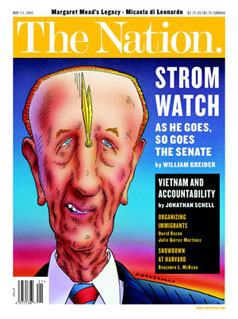.
MAY DAY, MAY DAY
May 1 was a warm spring day in Connecticut, but 8,000 nursing home employees braved the icy winds of the Bush-era labor climate when they walked out on strike. At issue are shamefully low staff-to-patient ratios, which rank thirty-third nationally in 200 nursing homes in the country's richest state, as well as wages and benefits. Republican Governor John Rowland has gone to extraordinary (and possibly illegal) lengths to crush the union, New England Health Care Employees District 1199, publicly calling for members, who are mostly women of color, to break ranks and stay on the job. Rowland also promised to pony up millions to pay for strikebreakers, a reprise of his response to the union's one-day walkout in March, when he authorized $4.6 million in Medicaid spending on out-of-state replacement workers. Because Medicaid funds account for three-quarters of the income stream to the state's nursing homes, the state government is a key player in contract negotiations. Rowland has pledged to cover strike costs of nursing home operators for thirty days; to keep workers in the fight the union needs to raise $1.2 million from nonunion sources. Make checks payable to the District 1199NE Strike Fund, 77 Huyshoppe Street, Hartford, CT 06106.
UNEMPLOYMENT ASSURANCE
A staple statistic in the financial news these days is the number of unemployment insurance claims for the month. But what the statistics don't tell you is how many out-on-the-street workers actually collect. A new study by Marc Baldwin for the National Employment Law Project finds that while only about 40 percent of the unemployed receive benefits nationwide, unemployment taxes are lower than any time in history. Baldwin estimates that twenty-two states lack sufficient reserves to cope with a recession. To read the report go to www.nelp.org.
PROGRESSIVE HEALTHCARE IDEAS
Kathryn Lewis writes: At a recent Capitol Hill conference sponsored by the Progressive Caucus and the Congressional Black and Hispanic caucuses a grim picture emerged of healthcare in America. The United States spends more on healthcare than any other nation in the developed world, yet thirty-six countries receive better services, according to the World Health Organization. Some 42 million Americans have no insurance, and 83,000 die each year because they can't afford a doctor. The caucuses are urging the creation of a comprehensive national health insurance program, an expanded version of Medicare that covers every American. Legislators talked up several pieces of legislation, including Representative Jesse Jackson Jr.'s bill to add a constitutional amendment guaranteeing healthcare for all, Pete Stark's measure to establish a health insurance program for all children and John Tierney's legislation allowing states to create their own universal health insurance programs. The consensus was to push reform one step at a time.
NEWS OF THE WEAK IN REVIEW
Asked four years ago if he would televise the execution of Timothy McVeigh, Don Hewitt, executive producer of 60 Minutes, said, "Over my dead body." In a recent interview, Hewitt allowed that he would show it. After all, he said, viewers see people strapped down on a gurney and knocked out every week on ER. Read More
The Editors
